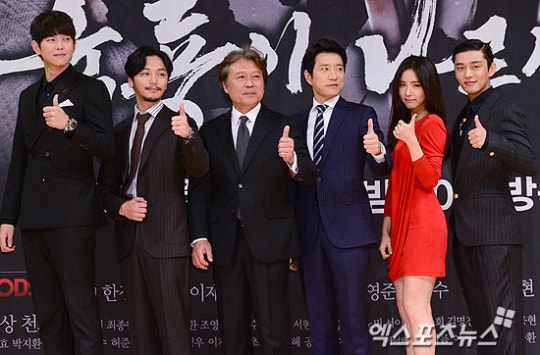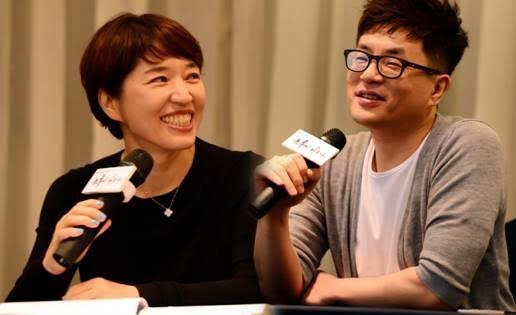Six Flying Dragons Writers Interview (Finale)
The original article link xportsnews / naver
An interesting read and giving more insights to the writers' point of view about the drama and the characters.
'육룡이 나르샤' 김영현·박상연 작가 "로망이고 모험이었던 작품" (일문일답)

Posted and shared via soompi thread SFD @homura
Translated in English

Kim Young-Hyeon (left) and Park Sang-Yeon (right)
“Our next project may be King Sejo.”
An interesting read and giving more insights to the writers' point of view about the drama and the characters.
'육룡이 나르샤' 김영현·박상연 작가 "로망이고 모험이었던 작품" (일문일답)

Posted and shared via soompi thread SFD @homura
Translated in English

Kim Young-Hyeon (left) and Park Sang-Yeon (right)
“Our next project may be King Sejo.”
● Six Flying Dragons (SFD) is the prequel to Tree with Deep Roots (TWDR). It was the first time in South Korea to produce a prequel TV drama. Was there pros and cons while you were writing the prequel?
It was our aspirations and adventurous attempt as a writer. As we have six main characters, the emotion of at least 15 characters should be handled in one episode. If we follow all of them, the drama’s pace can not help but slow down. It was too bad to skip the emotion of so many characters.
But it also has pros. We already knew where to go. “Milbon (Hidden Roots) should be created. Moo-Hyul should become Yi Do’s bodyguard. Jung Do-Jeon should be killed at one point. Boon-Yi should go back to Banchon. Ms. Dodam should appear…etc.” It was like putting the puzzle together?
At the same time, it felt like stepping into the ring with both hands tied. In the case of Tree with Deep Roots, we filled the blank with our imagination because of lack of data about the creation of Hangul (Korean alphabets). However, the history in SFD had so much detailed information like Wihwa island retreats, Jo Min-Soo, Choi Young that there was no room to insert our imagination. In a word, it was like a game with complex rules.
● Moo-Hyul is the character who goes through both TWDR and SFD. He left Yi Bang-Won and retired to his hometown, but he would become the closest bodyguard to King Sejong the Great. Why did Moo-Hyul leave Yi Bang-Won? And what’s the difference between Yi Bang-Won and King Sejong?
Moo-Hyul is the most ordinary commoner in SFD. Even if he hopes for success, he hates to do an evil thing and finds his worth from his work. He was fascinated by Yi Bang-Won in the beginning, but he must be suffering as Yi Bang-Won kills more and more people. Yi Bang-Won is a man of a great cause, and it is too much for an ordinary commoner like Moo-Hyul to follow him.
If Yi Bang-Won is a ruler of blood and iron, King Sejong is a ruler of humanities. Both of them have a great cause, but King Sejong has a warm heart like an ordinary man. That’s why Moo-Hyul was better off with King Sejong.
● Yi Bang-Won and Jung Do-Jeon in SFD show different interpretations from other historical dramas. What interpretation inspired you to create such characters?
In terms of the description of Yi Bang-Won, we added, rather than concealed or downsized, his cruel and ruthless deeds. For example, there is no historical record that Yi Bang-Won set fire to Dumoon-dong village or killed his half brother Bang-Seok with his own hands. Nonetheless, I heard from many people that they got to root for Yi Bang-Won. It is true that we started it with “Don’t hate Yi Bang-Won” but we never intended to glamorize him. He was just… a person with exceptionally strong will to power, and renounced the small in order to secure the great.
Sambong Jung Do-Jeon and Poeun Jung Mong-Joo had a mindset of Sadaebu scholars. Jung Do-Jeon’s position is like this. As the turbulent times are a crying evil, he should accept to use a scheme for political purpose. But he has constantly felt internal conflicts about it. It is a kind of his indecisiveness. Even though he is wielding absolute power, even though he is already aware of the danger Yi Bang-Won will cause, he can’t nip him in the bud early on.
There were fierce fights among Sadaebu in that period. When Jung Do-Jeon and Jung Mong-Joo attacked their opponents, they made ugly personal attacks on each other without any reserve. Instead, they didn’t go as far as to kill the opponent easily because they belonged to the intelligentsia. They fought within the system by using impeachment, which was in stark contrast to Yi Bang-Won who was beyond the rules. Therefore, they might seem to be pettier than Bang-Won in TV viewers’ eyes.
● Is there similarities and differences between Jung Do-Jeon in SFD and Jung Gi-Joon in TWDR?
We got to know about Jung Do-Jeon in the process of writing TWDR. Jung Do-Jeon was a great politician who founded “Joseon led by Sadaebu scholars”. While Goryeo was a stereotypical kingdom, Joseon was a nation based on the new frame created by Jung Do-Jeon. Therefore, if Jung Do-Jeon lost the power struggle, Joseon couldn’t exist at all.
However, although Milbon (Hidden roots) was supposed to have an intention to improve Sadaebu constantly, its original purpose had been tarnished over the time. Jung Do-Jeon wrote in the letter “Don’t fight for the sake of the dead” but his last will was crushed and thrown away by Bang-Ji. That’s why Milbon had become the revengeful and closed organization in TWDR.
Furthermore, the conflict between Jung Gi-Joon and King Sejong (in TWDR) was ideological confrontation. However, the conflict between Yi Bang-Won and Jung Do-Jeon (in SFD) is not ideological strifes. Of course they fight over which side should have an authority over the state affairs between king and ministers. But it is just brought about by their different position. If Yi Bang-Won had not been part of a royal family, he would have sided with the prime minister’s authority.
● There are pros and cons about historical drama. As a writer, what is your biggest concern in terms of viewers’ reponses?
Jo Min-Soo’s “bloody banquet”. In the history, Jo Min-Soo disappeared quietly. However, we couldn’t believe that he disappeared so quietly in such a turbulent age of warriors. We thought he was likely to clash with Yi Seong-Gye. We wanted to describe the clash between the haves and the have-nots on the land issue. That incident brought about the collapse of the haves (Jo Min-Soo, hereditary peers). We worried about criticism from Jo Min-Soo’s descendants because there is no historical record about it, but thankfully we received a positive response from them.
● I wonder why Cheok Sa-Gwang appeared. What is her role in this drama?
We claimed from the beginning that SFD would become a political martial arts drama. Cheok Sa-Gwang was necessary for martial arts plots. She is a person on the peak of warriors’ world, an absolute master. She is a sad character with a mild temper. She didn’t want to learn martial arts, but became the strongest master. Gil Tae-Mi was the same. He was an absolutely powerful martial artist with thick makeup.
● In this drama, what character do you feel the strongest affinity for?
We feel affinity for every one of them. If we have to choose, it would be “common people”. They were as important as Yi Bang-Won and Jung Do-Jeon. We wanted to show their power to live through the turbulent times and survive in the end.
Bang-Ji, Moo-Hyul, and Boon-Yi is the representatives of the “common people”. Boon-Yi represents the character who endures to save people and lives through til the end. Bang-Ji represents the one who has deep sorrow and pain in his heart. Moo-Hyul seems to live more comfortably than them, but he represents the ordinary commoners. They are fictional characters, but we wanted to make a good description of them along with the historical figures.
● Is there any supporting actor who conveyed the writers’ intentions very well?
Gil Tae-Mi and Jo Young-Gyu. We thought SFD’s success would depend on whether Gil Tae-Mi could become the talk of the town within the first 4 episodes. As a veteran actor, Park Hyeok Gwon played Gil Tae-Mi far more brilliantly than we had expected. In addition, Jo Young-Gyu who was killed by Cheok Sa-Gwang was played really well as an emotional trigger between Bang-Won and Moo-Hyul.
● Some people regard Six Flying Dragons and Tree with Deep Roots as the reinterpretation of Joseon Dynasty. Give us a hint about your next project.
We don’t have any plan yet. The future remains unclear. However, if we make it, the title would be “The water from a deep spring (샘이 깊은 물)” from “Songs of the dragons flying to heaven (용비어천가 龍飛御天歌)” It is likely to handle King Sejo’s usurpation of the throne (계유정난 癸酉靖難, October 1453).
* Songs of the dragons flying to heaven (용비어천가 龍飛御天歌)
http://bodashiri.tumblr.com/post/128099683001/the-origin-of-six-flying-dragonsCanto I
Six Flying Dragons in Haedong (the east of the Sea = Korea)
Everything they did was blessed by Heaven
Their pasts coincide with ancient sages.Canto II
A tree with deep roots,
Because the wind sways it not,
Blossoms Abundantly
And bears fruit.
The water from a deep spring,
Because a drought dries it not,
Becomes a stream
And flows to the sea.
It is a tragedy. There would be no good person here. All of them would be villains. King Sejo and Han Myeong-Hoe. Even though King Sejo was a precious son of King Sejong, he turned his coat after becoming King, and all the academic lines established by King Sejong died out during his reign. Unlike his grandfather King Taejong (Yi Bang-Won), he was swayed by contributors who helped him to ascended the throne. Compared with him, King Taejong (Bang-Won) was a far greater ruler. Yi Bang-Won removed his retainers ruthlessly for his son, King Sejong. Han Myeong-Hoe is a turncoat of Milbon (Hidden Roots).
However, there is no good person for viewers to sympathize with. That’ s the problem. In the end, the viewers can’t help but watch their fights in a third party perspective. Such a drama has never been successful in Korea. Therefore, if we really try it, it will be a risky attempt.


Comments
Post a Comment